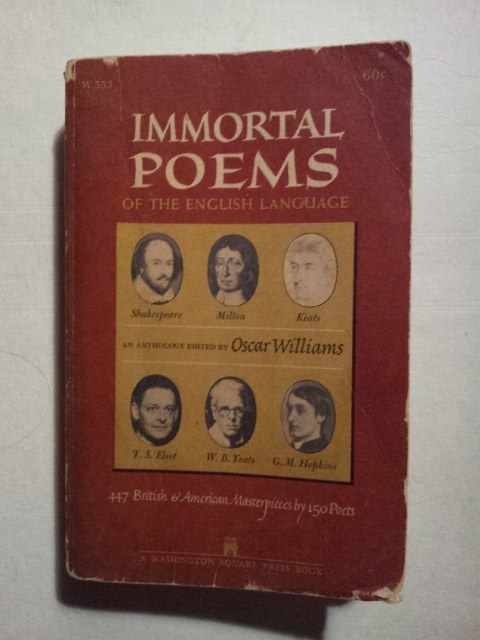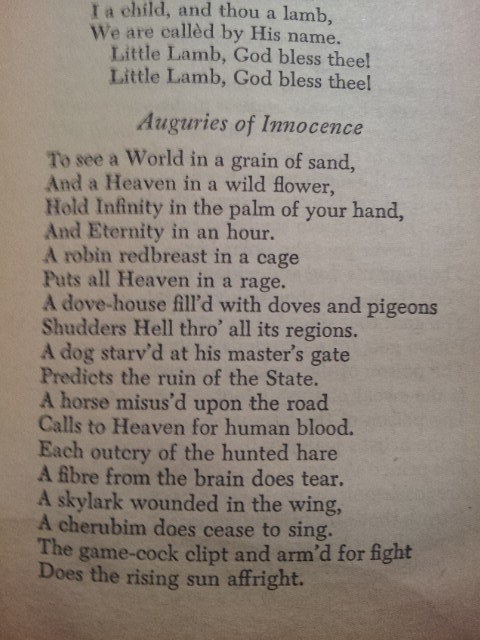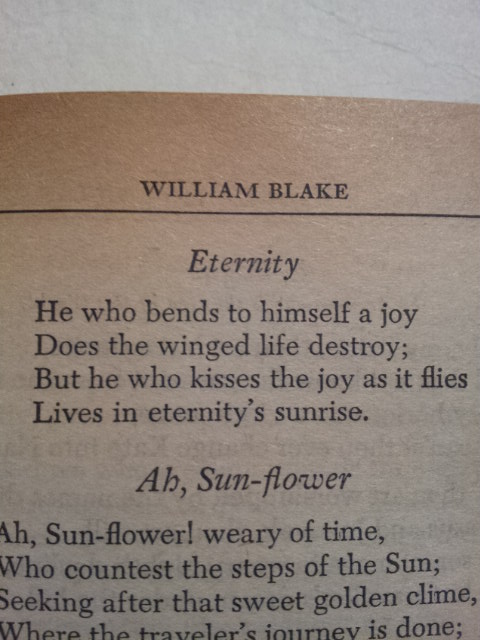A favorite poem to share as 2013 comes to an end

For a party last night, hostess Gina announced some weeks ahead of time that we were to bring “a favorite quote, poem, lyric or inspired thought to share as we look forward to 2014 with gratitude”.
I thought this was a really good theme for an end-of-year holiday party. At first I thought maybe I should write a new poem of my own, for the occasion. But I got cold feet and bailed out of that plan. Maybe for another party next year.
After thinking for a while, I decided I would return to an old favorite: the poetry of William Blake. I picked one of my (favorite) poems by him, and planned to recite it and say a few words at the party about what it means to me and how it applies in particular to my thoughts as 2013 comes to an end.
It turned out that we were all having too much fun at the party just eating and meeting people and talking and then some of us going off to play music together, and “forgot” about the quote/poem/lyric/thought thing for a while. But it was getting late and Abby and I had to get going at some point, so I reminded Gina about the theme, and she got everyone together and started off herself with a quote from Kafka. That led to some discussion, and then someone else offered a provocative thought, a question to the younger people present. It turned out that this question led to a lot of lively debate, which was great, but also meant that since I didn’t want to interrupt it, Abby and I had to quietly excuse ourselves and leave the party. I told Gina I would share my thought later on her party page.
Originally I was only going to say a few words, but as long as I’m not limited by keeping things very brief, I decided I might as well write a full-fledged post about it.
My accidental introduction to really good poetry
First of all, I want to say something about an accident that led to my discovering some really good poetry as a child. I was not (and still am not) primarily poetry-oriented (I am music-oriented), but exposure to good stuff led me not to completely ignore poetry through my life. I was 9 years old at the time (my sister 5). We were living in an apartment in Royal Oak, Michigan at the time. One day we discovered a couple of boxes of books out on the sidewalk, obviously put out for trash day. Since our family owned very little, and I was a voracious reader who always had to beg to go to the public library to get books to read, this was like treasure from heaven for us. Linda and I hauled our stash back inside, and sort of divvied it up between the two us. I will probably write more about this stash later, because over the years many of the titles played a huge role in both our lives. These boxes of books changed our lives in every possible way.
For now, I just want to mention that I came across the poetry of William Blake through one of these volumes that I got from the trash in 1979, “Immortal Poems of the English Language”. This book was already old and yellow when I got it from the trash then, having been printed in 1952, but they used to make books differently back in the day: really high-quality paper that stands the test of time. I still have this anthology on my book shelf at home. In fact, here’s a photo of it:

I didn’t browse through this book as a 9-year-old because I was interested in poetry. I did it because it was sitting there at home. A child who is at home and bored (this was before computers and video games and iPads, and we didn’t even have a working TV at the time: our old 1960s black and white vacuum tube TV had not survived the move to Michigan) will find anything at least potentially interesting.
I flipped through the volume looking for short, easy stuff to maybe read. Well, it turns out that a lot of Blake’s poetry is in fact really short, and really easy to read, without a lot of complicated words or subordinate phrases or fancy thoughts. (Much later, I realized that simple to read does not mean simplistic or “for children”.)
I didn’t fully understand what I was reading, but at least I got a taste.
Really enjoying Blake
My teenage years were quite difficult, filled with alienation, loneliness, anger, depression, and poor health. I found some unexpected solace reading Blake’s poetry. In fact, it turned out that I embraced the fundamental messages inherent in his work. I have changed my opinions about one thing or another in the decades of my life since, but one constant has been my admiration for William Blake: the man, the poet, the philosopher, the do-it-yourself.
There were several poems that really spoke to me then as they do to me now.
He means so much to me that one of these poems is actually the “secret” inspiration for the title and subtitle of this very blog that I started over two years ago. Why is this blog “Franklin Chen’s grain of sand: infinity in the palm of my hand”?
Read “Auguries of Innocence”:

The poem for yesterday’s party: “Eternity”
But that’s a complex poem, not the one I was going to share yesterday at the party. The poem for yesterday was a much shorter one, “Eternity”:
He who binds to himself a joy Does the winged life destroy; But he who kisses the joy as it flies Lives in eternity's sun rise.
(The old edition I have has “bends” instead of “binds”.)

This is a very powerful poem. I have not always abided by its advice, but I believe in its wisdom.
For me, the poem is about attachment versus detachment, and eternity versus impermanence.
The lesson I have learned the hard way in my life is that being attached to something, whether an idea or a possession or even a memory, leads to suffering, because it contradicts the reality of the world and of human existence. This year has been particularly challenging for me, as I gave up some old, familiar habits and beliefs and activities in order to start new ones.
It is hard to say goodbye to something familiar and comforting, whether it is writing computer programs in a certain language, or taking part in certain music performances because you’ve done that for two years and feel a camaraderie with others you have done it with, or giving up or scaling down on a beloved hobby. But then I remember that if we love something, that does not mean we possess it, or that it possesses us. A musical ensemble will continue on without us; we should be happy for it without constantly feeling regret or sadness at moving on. We should be grateful for what we have given ourselves to in the past, without feeling shackled by it. And that I’ve found myself used to thinking or behaving a certain way doesn’t mean I need to stay that way.
Easier said than done: there are still various things that I know I am still hanging on to that once made sense but now may not. Luckily, I have Abby as a source of input that can offer a point of view that is not just my own self-absorption. OK, I don’t always accept her point of view, but I am grateful that she expresses it and offers it as something for me to give myself permission to consider.
Instead of trying to capture and relive a perfect moment, we can look forward to brand new moments. And especially as a new year arrives, we can symbolically renew our sense of freshness.
This doesn’t mean necessarily throwing out the past; it just means recognizing the past as what it is, rather than as what we wish the future could still be.
Conclusion
I’d like to thank Gina for inviting us to take a moment to reflect on something of our choice as 2013 comes to an end. I wish I could have stayed longer last night to take part in the discussions that apparently lasted quite some time!

This post is full of great bits. I want to say more about it later.